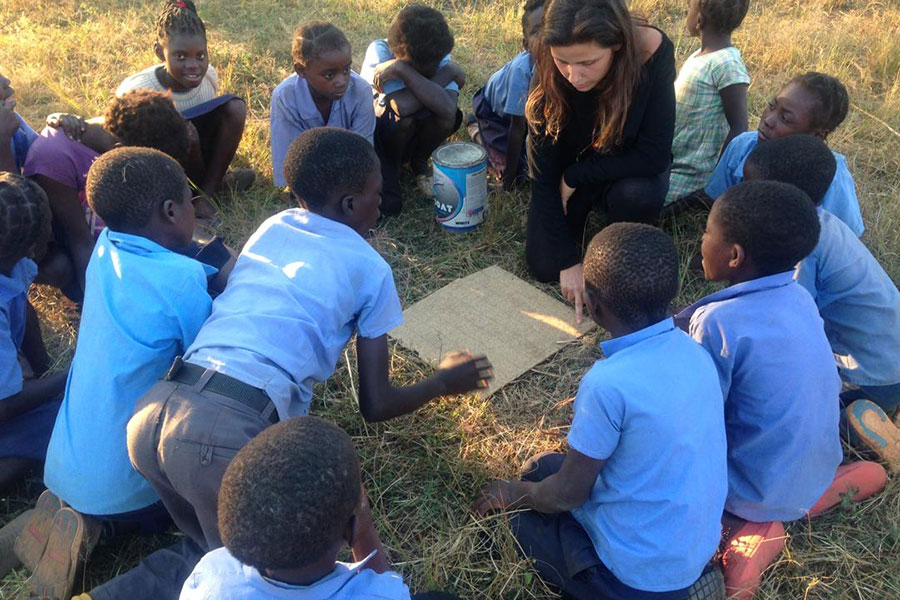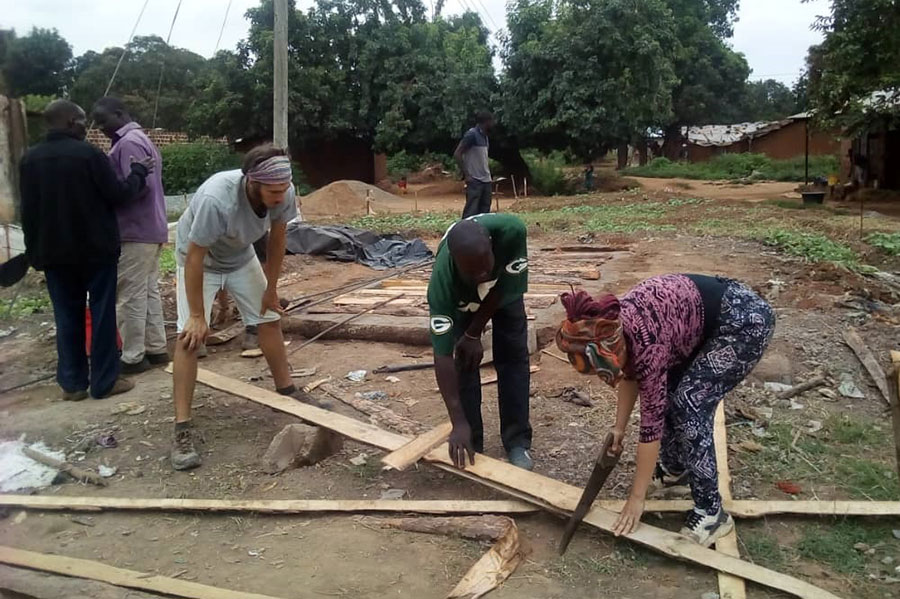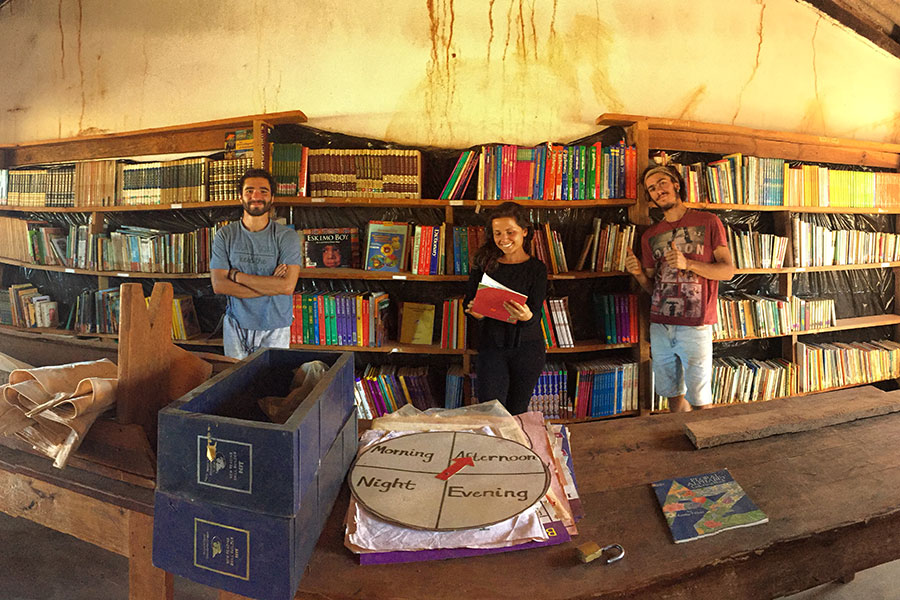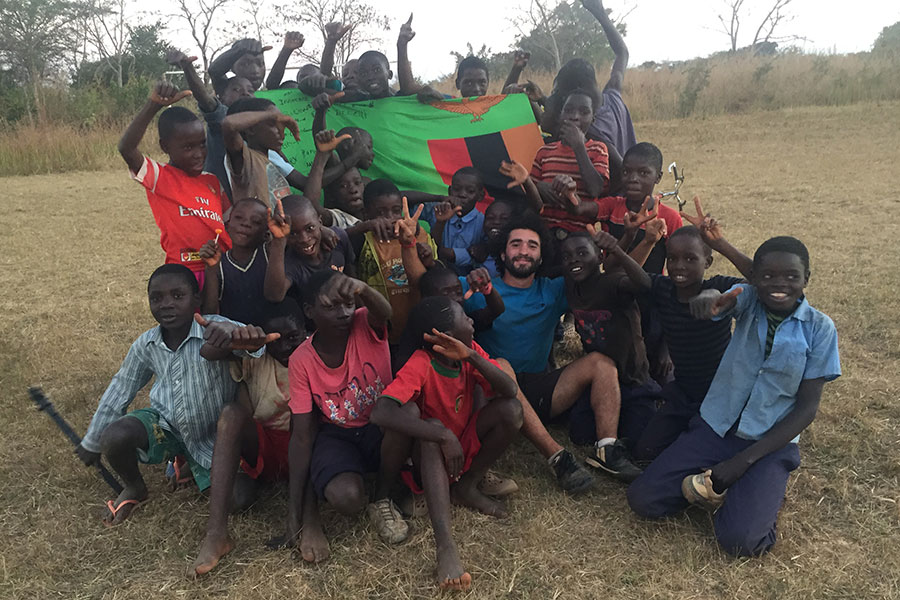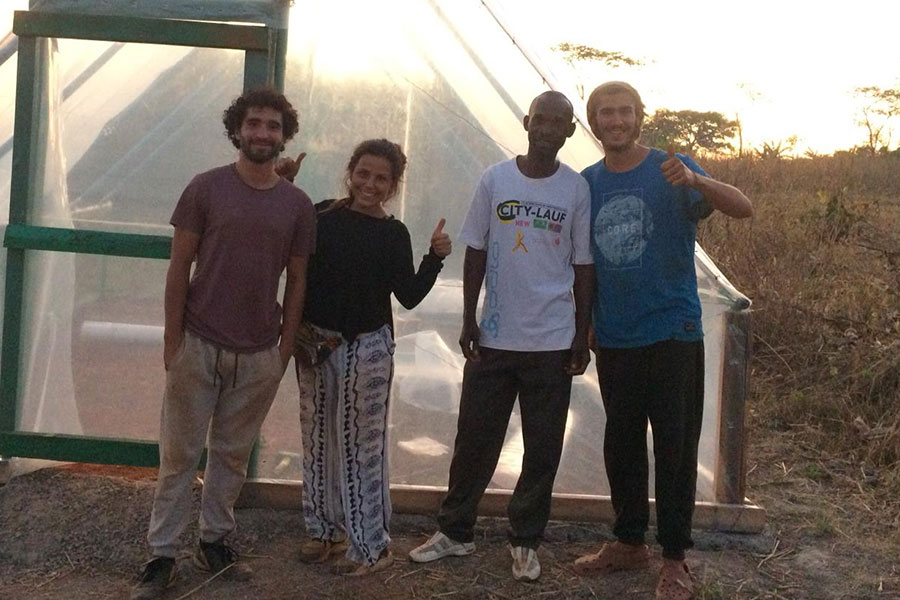By Juan Manuel (Pampa), Cristiana and Juan Arrellano, August 2018 Poverty Activist team
About Mumena Child Aid and Agriculture production
DAPP started the operation in Mumena in 1987, implementing a project related with youth development and production centre. Currently there are coexisting two different projects of DAPP: the agriculture production project and Child Aid Mumena.
The project in Mumena is working in 8 of the 10 lines of the Child Aid projects. Some of the main activities that DAPP is developing are: supporting many families organised in Village Action Groups and youth clubs, working with 14 community preschools and 10 primary schools, building another preschool and bringing clean water to the community.
In the beginning of our time in Mumena we were informed about some problems related with the deforestation, the cutting down of the local trees to have more space for the agricultural activities and also, to use the wood in order to build and cook. These native trees of Zambia have a really important role in the nature, and many of them take a long time to grow. The lack of these ones is becoming a big environmental problem. There are many areas inside the rural communities where is a dependance on the wood and is easy to see bush fields without many presence of trees or even empty of them.
Working on solutions with the communities
Recognising this problem, DAPP started to develop some activities of pine tree plantation because the pine grows fast and is adaptable to the local ecosystem. However, the tropical climate of Zambia bring many challenges to carry on this activity, especially during the hottest part of the dry season and the heaviest raining moment of the year. It is very difficult to breed in nurseries and transplant the seedlings during these extreme climate conditions. So there is a dependance in buying the young trees, which are expensive, making difficult the actions. Therefore, we discussed it together with the farm manager Simon Chipoya and with our project leader Anna Kanuanda, We concluded with the idea of building a green house to facilitate the breeding of the seedlings.
As we told in the last report, we finished May with the green house structure prepared, missing to buy the plastic to finish it. Between this time before the plastic arrived, we organised ourselves with the school to continue with the sport activities and also, to realise different workshops and programs with the pupils and the talking walls project.
In the beginning of this time, we realised that our time in Mumena was not enough to achieve the several schools that are in the area. We decided to focus our activities in one of them, looking for having a bigger impact in the pupils, and giving an example for other programs that DAPP can start to promote in the other schools.
Activities
Sport activities
We continued to use the afternoons doing sport activities with the pupils of Mumena B school. Our main activities were, in the beginning, netball and football. Looking to give another option, using the space that is there, we made a volleyball net with recycling materials and started to practice also this sport.
When we started to do sport activities in the school, we were informed about the program of the school of having a football and a netball team for practicing sports on Tuesdays and Fridays. Following this idea, we helped to organised the teams and the activities during this month. We divided ourselves in the activities that they wanted to practise:
- Pampa started to train the football teams, creating a routine according the school program. On Mondays grades 2 and 3 and on Tuesdays grades 4, 5 and 6.
- Cristiana and Juan started to participate in the netball lessons on Tuesdays.
All of us put focus, not only in the matches, but also in the importance of the warming up, stretching and doing exercises to improve individual and team skills. Our goal was to start to implement the physical education in the sport activities.
In addition, we continued participating in other activities and training during the week, making part in the routine of the youths and the pupils. Many afternoons we were playing netball, football and volleyball with the pupils after the school and Pampa continued taking part in the youth football team of the community, participating in the training and the matches. Unfortunately, during this period of the year, most of the women and some of the men were busy harvesting the maize, so we could not continue with the youth netball team.
“Talking walls”
When we started to work in the school, different members of the school teacher council suggested and asked us some tasks for improving some areas of the school. The classrooms were needing to be painted with alphabets and the vowel sounds used in Kiikaonde, the local language. The school also needs to remake the official post of the government in the main road of the area. Also, we were suggested to draw a mural with the Zambian map and we proposed to do also the world map.
We could achieve the goals: painting the alphabets in the three classrooms that were missing, and the Kiikaonde vowel sounds in four class rooms, the post at the main road and the two murals with the different maps and messages given by the teachers.
Building a Green-house
The green house project had been stopped until the budget for buying the plastic was approved. In the middle of June we were informed about the approval of the budget, and we could manage to continue this activity in the third week of the month.
In the beginning we thought we could finish the green house in a couple of days, but there appeared many challenges and difficulties that we had to manage, trying to find the solutions without having a previous experience. After solving these problems, we finished the greenhouse in the end of the week.
Our idea is to use it as a pine trees nursery for the tree plantation programs.
Even if we could not sow the first pine seeds, we could use the green house as a learning tool, bringing the grades 8 and 9 to give a talk about green house effect and climate change. We focus ourselves not only in the utility of these building, but mainly also the importance of fighting against the global warming using tree plantation looking to reduce the pollution.
Workshops and library
During this time we carried on different activities with the students of the school:
We organised, with the help of some students, the library of the school. The first step was to clean and to spray, with insecticide, the walls to prevent and to eliminate termites. Secondly, we cleaned all the books and organised them in categories. Lastly, we cleaned the room and prepare it to use.
Related with the library, we decided to make some board games with recycled materials and clay, giving an easy option to replace in the case it is needed. The idea was to give more alternatives to the break times of the pupils placing these games in the school library.
Compost place
Giving an alternative to the chemical fertilisers, we decided to create an organic compost place, where the organic waste can be used to create manure for the agriculture. Taking advantage of the gardening action that was being done by the students, we organised a talk with the grade 9 about the benefits of organic fertiliser over the chemical one and how to implement it, promoting this alternative in the school and their homes.
During these last two workshops we had the support and the presence of the teachers because the topics were part of the school study program, giving to the student a practical vision and alternative way of the agriculture subject. We could include them in the school daily schedule as an extracurricular activity.
Our Conclusion at the end of the 6 months
During our time in Mumena we faced different challenges, related mainly with the little time we would spend there and the budgets approval. As an example, we planned a growing mushroom action in the office, looking to extend it to the different saving up clubs. The activity was not successful because we did not have the materials on time and the money for the spawns. We thought that this can be a good income generating activity to empower the youth and women clubs.
We finished the period knowing that many things should be done and continued in this area.
In our opinion, development actions should follow the lifestyle of each place. As DAPP is doing with the agriculture course in Mumena, we tried to focus ourselves in activities that fit with the way of living of the people there. We saw that many people do not give value for the traditional ways of working, so we tried combine these ones with some modern ideas.
As well as we tried to give importance to the traditional ways of working, building and planting, we bumped into many thoughts that the people call tradition that we believed that should be fought against. As an example of what we are talking about is the unequal situation between the women and the men. We lived many situations in Zambia were the women were treated in a inferior role and under submission of the men, and also many people that attributed this to the tradition. We hope that DAPP continue working and fighting against these unfair situations and thoughts, promoting sensitisation and women empowerment actions. We know that this is a slow and long process, but we believe that an active fight is the way to change this conditions.
Teaching - yes! But learning much more!
After these six months in Zambia, we realised that our contribution here is like a drop in the ocean. We came here trying to do our best, but we know that the real development is not in us, is in the people that live in this country. Our time here passed very fast, but was long enough to exchange our vision and culture with the people that are trying to make Zambia a better place.
We gave a small contribution working with the real protagonists of the development work: the people that live here.
To conclude, we want to say thank you for the opportunity of having this amazing experience, because we think that the people who benefitted more were us.
When different cultures have the chance of meeting and working together, both sides learn and grow as human beings. If the people could take something from us, is nothing compared with the things that we learned and took from Zambia.





